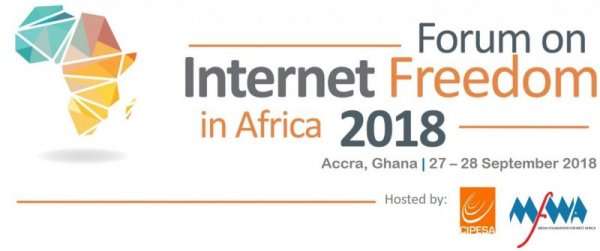By Juliet Nanfuka |
In less than a month, the Forum on Internet Freedom in Africa 2018 (#FIFAfrica18) will take place in Accra, Ghana. Hosted by the Collaboration on International ICT Policy for East and Southern Africa (CIPESA) in partnership with the Media Foundation for West Africa (MFWA), this year’s Forum is the first to be held in West Africa. Since its inception in 2014, the Forum has been hosted in East Africa and Southern Africa.
FIFAfrica focuses exclusively on internet rights and freedoms and looks at them through the lens of policy, regulation, and governance. It offers a platform for critical engagement of diverse stakeholders in identifying the most pressing internet rights-related issues and challenges that have to be addressed at national and regional levels. It also identifies opportunities for bringing the debate on the importance of human rights online at national, regional and global fora and aims to identify effective ways to engage with them.
At the practical level, the Forum works to support skills development including in digital security practices for safe and secure ICT access and adoption, policy advocacy, and engagement processes.
Engagements at the Forum reflect current trends and concerns in access and usage of the internet and related technologies on the continent. As such, each year since 2014 has seen us launch themed research on the State of Internet Freedom in Africa. The Forum also coincides with the annual commemoration of the International Day for Universal Access to Information (IDUAI) that is marked every September 28.
This year we have lined up panel discussions, workshops, hubs, exhibitions and lightning talks on a diversity of topics including advancing advocacy and research on gender-based cyber violence in Africa, civic technology and social innovation, online content regulation trends in Africa, and community networks for internet access. Other topics include: African content online, consumer rights in the digital age, digital rights advocacy, the economic costs of social media taxes and internet shutdowns, as well as media and misinformation, and protecting vulnerable users of the internet. Additionally, FIFAfrica will provide a stage for the first assembly of the Ethiopian Zone 9 Bloggers since their release, where they will share their experiences of censorship amidst the plight of freedom of expression.
The Forum agenda and sessions have been shaped by a public call for proposals and speakers and thus represent diverse voices, expertise and stakeholder groups, many of them new to FIFAfrica.. Among these are the Council of Europe who will host a panel that will contribute to the on-going efforts on harmonisation of national cybercrime laws with international and regional standards in the African continent, and provide a specific focus on human rights safeguards. Meanwhile, digital rights group NetBlocks will have their Africa launch of the Cost Of Shutdown Tool (COST). The tool was developed by NetBlocks in collaboration with the Internet Society and first unveiled at RightsCon Toronto in May 2018. It is aimed at automating the task of economic estimation of the impact of internet shutdowns, mobile data blackouts and social media restrictions.
Additionally, September 28, 2018 will mark the third commemoration of the International Day for Universal Access to Information (IDUAI), first celebrated by UNESCO in 2016. The IDUAI reinforces target 16.10 of the Sustainable Development Goals (SDG) which calls for ensuring public access to information and protection of fundamental freedoms. As part of the IDUAI 2018 celebrations, UNESCO is set to host a session at FIFAfrica to raise awareness on the intersection of access to information and application of the internet universality indicators.
Skills workshops at the Forum will include one on strategic litigation led by the Media Legal Defence Initiative (MLDI) which is aimed at building the capacity of internet activists to collaborate across disciplines to more effectively push back against regressive legal frameworks that are not conducive to access and use of the internet in Africa. CIPESA, together with the UK-based Small Media, will also host a two-day interactive workshop on internet freedom and the Universal Periodic Review (UPR). The workshop is part of a wider project working to support civil society organisations across Africa to engage with the UPR process through research, capacity development and developing tools to support internet freedom advocacy.
The Forum’s growing audience – from 80 participants representing six countries in 2014 to over 250 from 35 countries in 2017 – the diversity of participants and discussions, reflects increased awareness among Africa’s growing internet user and stakeholder community for the need to pave the way for broader and more impactful work on advancing digital rights advocacy and drawing up common strategies to promote internet freedom.
This year, we aim to continue on this growth path as the community of internet freedom advocates steadily grows and the opportunities to advance internet freedom are progressively realised particularly in the face of persistent affronts to the rights of African online users.
You can still register here | See the draft agenda

